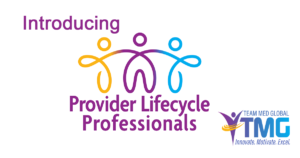 For years, the healthcare industry has relied on dedicated professionals to ensure that providers are properly licensed, credentialed, privileged, enrolled, and aligned with quality standards. These individuals play a critical role in safeguarding patient care, upholding regulatory compliance, and maintaining the operational integrity of healthcare organizations. Yet, despite their expertise and essential contributions, many have struggled to find a professional identity that fully reflects the breadth of their work.
For years, the healthcare industry has relied on dedicated professionals to ensure that providers are properly licensed, credentialed, privileged, enrolled, and aligned with quality standards. These individuals play a critical role in safeguarding patient care, upholding regulatory compliance, and maintaining the operational integrity of healthcare organizations. Yet, despite their expertise and essential contributions, many have struggled to find a professional identity that fully reflects the breadth of their work.
That’s why TMG is introducing the term Provider Lifecycle Professionals—a comprehensive and inclusive designation for those who support the provider lifecycle across multiple domains. Whether you work in licensing, credentialing, privileging, provider enrollment, or quality, this term acknowledges the full spectrum of responsibilities you manage. It’s more than just a name change; it’s a recognition of the evolving nature of healthcare administration and the deep expertise required to navigate it successfully.
Why This Matters
Historically, many in these roles have been grouped under the title of Medical Services Professionals (MSPs)—a term most closely associated with credentialing and privileging in hospitals and health systems. While this designation has served credentialing specialists well, it does not fully encompass the diversity of functions that exist across healthcare organizations. Professionals working in licensing, provider enrollment, and quality, for example, may not see themselves as MSPs, despite the interconnected nature of their work.
By shifting to Provider Lifecycle Professionals, TMG aims to:
- Recognize the full scope of responsibilities: Credentialing is just one piece of a much larger system that ensures providers are properly vetted, enrolled, and continuously meeting quality standards. A unified term acknowledges all aspects of this work.
- Unite professionals across disciplines: Licensing, enrollment, quality, and other related functions are often siloed, despite their shared goals. This new terminology fosters a sense of connection and collaboration.
- Elevate the profession: The work of Provider Lifecycle Professionals is fundamental to the success of healthcare organizations, yet it has often been overlooked or misunderstood. A strong, well-defined identity can enhance industry recognition and professional opportunities.
A Profession on the Move
The healthcare landscape is rapidly evolving, and so are the roles of those who support provider lifecycle functions. Regulatory changes, shifting payer requirements, and advancements in technology have made these roles more complex and demanding than ever. Whether you are navigating licensing requirements across multiple states, ensuring seamless provider enrollment with payers, or overseeing credentialing and privileging, your expertise is critical to keeping healthcare running smoothly.
The term Provider Lifecycle Professionals reflects this dynamic environment. It acknowledges the adaptability and strategic thinking required to excel in these roles. It also signals to healthcare organizations that these professionals are not simply administrators—they are essential to ensuring compliance, reducing risk, and supporting operational efficiency.
Looking Ahead
As the industry continues to evolve, so too must the way we define and recognize the professionals who sustain it. The shift to Provider Lifecycle Professionals is an important step in aligning the profession with the full breadth of its impact. It provides a unified identity that acknowledges the complexity of the work, builds connections across related disciplines, and strengthens the professional standing of those dedicated to managing the provider lifecycle.
For those who have never quite felt like “MSPs,” this is an opportunity to step into an identity that better reflects the value of your contributions. For those who have long been part of the credentialing community, this is an expansion—one that recognizes the interconnected nature of licensing, credentialing, enrollment, and quality.
At TMG, we see this as a natural progression for the profession, one that ensures that every individual who supports the provider lifecycle is seen, valued, and empowered. After all, healthcare wouldn’t function without you.

